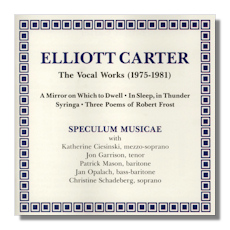
The Internet's Premier Classical Music Source
Related Links
- Carter Reviews
- Latest Reviews
- More Reviews
-
By Composer
-
Collections
DVD & Blu-ray
Books
Concert Reviews
Articles/Interviews
Software
Audio
Search Amazon
Recommended Links
Site News
 CD Review
CD Review
Elliott Carter

The Vocal Works (1975-1981)
- Three Poems of Robert Frost (Version: 1980 for baritone and chamber ensemble) 1
- A Mirror on which to Dwell 2
- Syringa 3
- In Sleep, In Thunder 4
1 Patrick Mason, baritone
2 Christine Schadeberg, soprano
3 Katherine Ciesinski, mezzo-soprano
3 Jan Opalach, bass-baritone
4 John Garrison, tenor
1 Speculum Musicae/David Starobin
2 Speculum Musicae/Donald Palma
3 Speculum Musicae/William Purvis
4 Speculum Musicae/Robert Black
Bridge BCD9014
The excellent series of Elliot Carter's (who will be 103 this December) music is organized not chronologically; but by concept, or genre. This release concentrates on the vocal works which he composed at the end of the 1970s, when his style was very different from now – but nevertheless contained many pointers to techniques and priorities which he has developed and accentuated in the last 30 years.
The five soloists and four conductors who work with Speculum Musicae (or in many cases are actually part of the ensemble: William Purvis is the group's horn player, Donald Palma its bassist, for instance) have to be credited immediately for superb, idiomatic, lively, communicative and persuasive performances from the first note to the last. Together with an excellent, dry and concentrated acoustic, and a presentation (booklet, price and design etc) by Bridge that supports the music, their accounts make this a volume in the series particularly welcome.
The total of 16 songs which comprise The Vocal Works (1975-1981) are in four individual pieces. The Three Poems of Robert Frost was written in 1942; the version here is that orchestrated in 1980 for baritone and chamber ensemble. It's short, concentrated, approachable, taut and full of musical as well as textual impact. Patrick Mason is an implicit (nothing self-conscious though) advocate for Carter's skills in matching text to music.
The other poets – and this CD must push home the point of just how avid and enduring are Carter's belief in and attachment to poetry, and modern American poetry at that – are Elizabeth Bishop (A Mirror on which to Dwell), John Ashbery(Syringa), and Robert Lowell (In Sleep, In Thunder). Each short set (no cycle lasts more than 20 minutes) inevitably focuses on the characteristics of the poet in question. Yet in no measure relegates the musical ideas, textures and instrumentation to second place. That's Carter's great gift in this context. The clarity, insight, relative weight of singer and ensemble, for example in A Mirror on which to Dwell, is remarkable. And Christine Schadeberg's empathy with the composer's balance could hardly be bettered. Her enunciation is literary, but entirely supportive of the music itself at the same time.
The same goes for the partnership which Katherine Ciesinski, Jan Opalach and a somewhat reduced (to 10 players) Speculum Musicae in the amazing dual path of Syringa. The work presents (almost) simultaneously the Greek original (only the translation appears in the booklet's text pages) sung by Opalach and Ashbery's poem by Ciesinski. By a relaxed yet directed approach, the musicians avoid the need to demonstrate (perhaps to skeptical listeners) that such a mélange of sound and words can work. Of course it does. Perhaps Carter is pre-empting and query from such doubters by setting one of the most famous loci in classical literature which challenges the enduring value of art when faced with (other kinds of) loss… Syringa deals with the Orpheus myth.
Lowell's In Sleep, In Thunder has the additional poignancy of having been written (in 1981) just four years after the poet died. It was always intended as a portrait of Lowell. Here (too) are the dualities so beloved of Carter: between excitement and resignation, between the comic and regret. At the same time they must have their head; they must even perhaps appear out of control. Yet Carter structures their appearance and interplay with strictly musical technique. As he does in so much of his other music. Nor do the performers misunderstand this broadest of counterpoints as being restricted to time (sequence), contrast (pathos, for example) or arresting incongruity of word and orchestration. Rather, they let the musical magic (listen to the strings in the opening poem, "Dolphin" [tr.11] use its own logic and references (both internal and external) to pull us where it will.
If you have other volumes in Bridge's series, don't overlook this one. If you're familiar with other aspects of Carter's output – maybe with his work in later decades – this has a great deal to recommend it. If you're new to Carter altogether; yet want music-making of great variety, commitment and understanding with a sense of a live performance (it's not, though it was made under the composer's supervision), and welcome the stimulus of beautiful music expertly and beautifully played, then this CD will prove immensely satisfying.
Copyright © 2011, Mark Sealey.





















